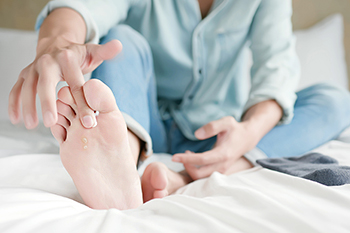
The foot condition that is known as athlete’s foot is considered to be contagious. It can be uncomfortable and unsightly, and is caused by a fungus. This is not a serious condition, despite the fact it can be difficult to cure. There are specific groups of people who may be at risk for developing athlete's foot. These can consist of patients who are frequently in locker rooms, use public swimming pools, have sweaty feet, or who choose to share towels, socks and shoes. The symptoms that are commonly experienced with this condition can include red skin, which may crack and peel, brittle toenails, and blisters may develop on the feet that can itch. Athlete’s foot typically does not heal on its own, and if you are afflicted with this condition, please contact a chiropodist who can prescribe the correct medication for you.
Athlete’s foot can be uncomfortable and unsightly. To learn more about preventing and treating this condition, please consult with one of the chiropodists from Complete Family Footcare & Therapy. Our clinicians will assess your condition and provide you with quality foot and ankle treatment.
What Is Athlete’s Foot?
Athlete’s foot refers to an infection of the skin on the feet that is caused by a fungus. This fungus is contagious and thrives in warm and moist environments. It is often spread in common areas such as public pools, locker rooms, and showers. It can also spread when sharing personal items, like shoes or towels, with an infected person.
Symptoms
The symptoms of athlete’s foot may include:
-
Itching, stinging, or burning of the skin on the feet
-
Cracking or peeling skin, especially between the toes and on the soles of the feet
-
Scaly, red rash on the foot
-
Blisters
-
Foul odor
Treatment
Treatment for athlete’s foot typically involves using over-the-counter topical antifungal medications on the feet. When over-the-counter options are ineffective, you may need to take prescription oral medications or topical antifungal drugs, or a combination of both.
Prevention
Preventing athlete’s foot places an emphasis on good foot hygiene practices.
You can prevent athlete’s foot by:
-
Washing and drying your feet thoroughly every day
-
Wearing shoes when walking in public areas
-
Not sharing personal items, like shoes or socks, with others
-
Wearing shoes and socks made out of breathable materials
If you have any questions, please feel free to contact our offices located in . We offer the newest diagnostic and treatment technologies for all your foot care needs.
